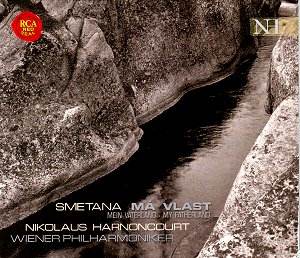Má Vlast is undoubtedly one of
the best known works of Smetana even when knowledge is restricted
to the tone poems, 'The Moldau' and 'Bohemia's Woods
and Fields'. The work is not of ideal length for a CD, running
to just a few minutes over its capacity and necessitating two
CDs if played unabridged or unhurried. Of the many versions available
perhaps three of the best are Kubelik, Mackerras and Talich. Kubelik
has much affection for this work, having recorded it five times
in a catalogue with over 32 versions (some being repeats with
different couplings). The Czech Philharmonic Orchestra with its
excellent Bohemian musicians has generally been accepted as a
favourite for a number of Má vlast recordings, yet
Vienna with its Philharmonic is geographically close by and is
likely to carry the necessary Bohemian nuances. So how does Harnoncourt
in this 2001 Austrian recording with the large forces of the Vienna
Philharmonic match up to any previous recordings already in the
listener's mind?
Harnoncourt has made his reputation with works
of the German masters rather than those of Bohemians like Smetana
yet he is capable of releasing hidden textures the score might
have to offer. The truth is that we have an orthodox, leisurely
and light reading of the score that is brought to life with sparkling
brass and clear melodic lines. The dynamics tend to be stretched
to provide additional impact.
The opening part, Vysehrad is rich
in texture with harps (nicely focused) and warm horns delivering
the main motif that becomes a common theme throughout. This same
theme is heard prominently in the Vltava (Moldau). Here
Harnoncourt accentuates a pulsing rhythm and pointed brass to
engaging effect.
The Moldau is played with sensitivity
with the first violins clearly placed. One can actually follow
the viola line where they carry the rippling undercurrent of motion.
Perhaps the crescendo (At the Rapids) is somewhat too heavy with
the brass, but then it does provide an agreeable contrast with
the pianissimo ending.
The Sarka myth opens dramatically
with swirling strings and harsh chords. This then melts into one
of Smetana's most likeable passages - music that bounces along
with skipping rhythm and an air of Tchaikovsky. The score is nicely
handled with its rises and falls of emotion.
I found the opening to Bohemia's Woods
and Fields far too heavy. Strident chords from brass and
timpani are surely not how one might depict woods, fields and
groves. And when the chords subside, the contrast is so marked
you are thrown unexpectedly into the more natural pastoral setting
that follows. Interestingly, in the notes, Harnoncourt gives no
explanation as to why he makes this opening so strong.
I don't know whether Smetana scored the piccolo
so much to give brilliance to the Tábor and
Blanik parts but at the ending its 'top' sounds
more throaty than pure and for my liking is too prominently focused.
The recording is spacious and I was surprised
to read that it was in fact a live performance (Musikverein, Vienna)
for there is no audience intrusion during the near-silent ultra-pianissimo
passages. The orchestral sections are brilliantly balanced, as
good as any studio recording.
The interesting notes (eight pages) are written
by Harnoncourt himself and carry musical examples of the key melodies.
I had not fully appreciated the legend/myth/nature/history background
to each part before (these I have shown alongside the part titles)
and I found the notes revealing. For the listener with a score,
Harnoncourt has usefully indicated the bar numbers to the various
passages he describes. However, it would have been of more universal
help to have indexed the passages with track timings rather than
bar numbers. The notes are provided in German, English and French.
Raymond Walker
